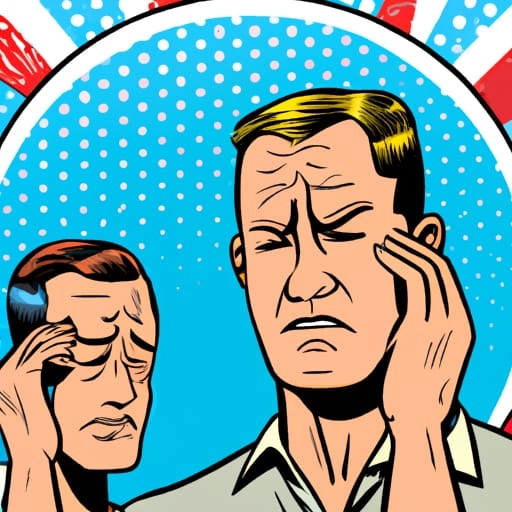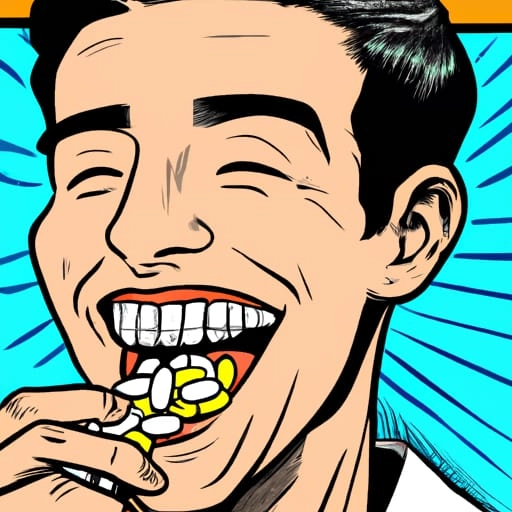Does Depression Make You Dumber? Can Your Brain Go Stupid?

Let’s Start With A Description of Depression
Depression is a mental illness that is characterized by a persistent feeling of sadness and a loss of interest in things that a person used to enjoy. Low self-esteem, negative thoughts, anxiety, irritability, trouble focusing, lack of sleep, and changes in appetite are some of the most common symptoms of depression.
A person with depression may also feel physically sick, with headaches, muscle aches, and tiredness being some of the signs.
This blog explores the relationship between depression and cognitive ability, and whether depression can make someone dumber. The purpose is to dispel common myths and provide accurate information on the topic.
The Impact of Depression on the Brain
CHANGES IN BRAIN STRUCTURE AND FUNCTION DUE TO DEPRESSION
Depression is a mental illness that has been shown to cause significant changes to the structure and function of the brain. Scientific studies have demonstrated that depression can lead to alterations in brain regions involved in the regulation of mood, as well as in cognitive processes such as memory and learning. One specific example of these changes is a reduction in the size of the hippocampus, which is a crucial brain area for the formation and retrieval of memories.
Additionally, depression has been linked to alterations in the activity of the prefrontal cortex, which plays a key role in executive functions such as decision-making in daily life, planning, and problem-solving.
THE EFFECT OF DEPRESSION ON COGNITIVE ABILITIES
Depression and low mood can have a negative effect on memory, attention, and focus through several mechanisms.
Neurotransmitter imbalances: Depression and low mood can affect the levels of neurotransmitters, such as serotonin and norepinephrine, which play a crucial role in regulating mood and attention. Decreased levels of these neurotransmitters can lead to problems with memory, attention, and focus.
Inflammation: Chronic low mood and depression can increase inflammation in the brain, which can result in decreased cognitive function and memory problems.
Reduced neuroplasticity: Depression and low mood can affect neuroplasticity, which is the brain’s ability to change and adapt in response to experience. Reduced neuroplasticity can lead to decreased cognitive function and memory problems.
Poor sleep: Depression and low mood can interfere with sleep, leading to sleep disturbances, which can result in decreased attention, focus, and memory.
Increased stress: Depression and low mood can increase stress levels, which can cause problems with attention, focus, and memory. This is known as ‘brain fog’. Stress can also increase inflammation in the brain, further contributing to cognitive problems.
It is important to note that these factors can interact with each other and with individual differences in genetics and environment to produce varying impacts on memory, attention, and focus.
DEPRESSION CAN MAKE YOU TURN TO POOR QUALITY FOOD AND OVERUSE ALCOHOL, CAFFEINE, SUGAR, AND STREET DRUGS
Poor diet, alcohol, caffeine, sugar, and street drugs can all have a negative impact on brain function and intelligence.
Poor Diet: A diet lacking in essential nutrients such as omega-3 fatty acids, vitamins, and minerals can negatively impact brain function. The brain relies on these nutrients to maintain healthy brain cells and facilitate communication between neurons. A diet high in processed foods and low in fruits and vegetables can also lead to inflammation, which has been linked to decreased cognitive function.
Alcohol: Chronic alcohol abuse can lead to a condition known as alcoholic neuropathy, which is characterized by damage to the brain and nervous system. This can result in memory problems, difficulty with attention and concentration, and reduced overall cognitive function.
Caffeine: Although caffeine can provide a temporary boost in alertness and attention, excessive caffeine consumption can lead to anxiety, insomnia, and decreased cognitive function in the long term. Caffeine can also affect the balance of neurotransmitters in the brain, leading to decreased focus and concentration.
Sugar: Consuming large amounts of sugar can lead to a rapid spike in blood sugar levels, followed by a crash that can result in fatigue and decreased cognitive function. Over time, a diet high in sugar can also lead to insulin resistance, which has been linked to decreased brain function and an increased risk of developing neurodegenerative diseases.
Street Drugs: Street drugs such as cocaine, methamphetamine, and heroin can have a significant impact on brain function. These drugs can disrupt neurotransmitter function, leading to decreased cognitive function, memory problems, and a decreased ability to learn and process information. They can also cause brain damage, leading to long-term cognitive impairment.
It is important to note that these substances can interact with each other and with individual differences in genetics and environment to produce varying impacts on cognitive function.

Studies on the relationship between depression and intelligence
THE EFFECT OF DEPRESSION ON INTELLIGENCE
Several studies have been conducted to examine the relationship between depression and intelligence. The findings of these studies are mixed and vary in terms of the specific aspects of intelligence that they have examined.
IMPACT OF DEPRESSION ON GENERAL INTELLIGENCE
A study by Nord et al. (2009) found that patients with major depressive disorder showed deficits in intelligence during affective episodes and following clinical improvement . This suggests that depression can have a negative impact on general intelligence.
RUMINATION AND IMPAIRED COGNITION
Rumination is defined as repetitive and persistent thoughts, feelings, or worries about negative experiences or events. The study by Diefenbach et al. (2006) found that rumination induction can lead to performance deficits on cognitive tasks in depressed and anxious individuals. This suggests that repetitive negative thoughts associated with depression can have a detrimental effect on cognitive functioning.
ANTIDEPRESSANT MEDICATION
The study by Bortolato et al. (2019) examined the effect of three common antidepressant medications on depression-related cognitive impairment and found that while these medications can improve mood and increase the ability to participate in beneficial activities, they do not confer protection against cognitive impairments related to depression . This suggests that while antidepressant medications can improve mood, they do not necessarily have a direct impact on cognitive functioning.
INTELLIGENCE AND NEUROTICISM
A study by Köhler et al. (2018) investigated the relationship between intelligence and depression. This study found that higher intelligence may protect against depression, as it found a positive association between higher intelligence and lower levels of depression. In this study, participants with higher levels of intelligence tended to report lower levels of depression, compared to those with lower intelligence levels. The study also found that higher levels of neuroticism, which is associated with increased vulnerability to depression, was positively associated with self-reported depression. However, the study did not find a significant interaction between intelligence and neuroticism, which suggests that higher intelligence may not completely protect against depression.
This study highlights the complex relationship between intelligence and depression, and that while higher intelligence may ameliorate the effects of depression, it is not a guarantee against the onset of depression. It also highlights the need for continued research into the interplay between cognitive abilities and mental health, to better understand and treat depression.
The Dangers of Self-Stigma: It’s About How You Feel
Self-stigma refers to the negative attitudes and beliefs that individuals with mental illness hold about themselves as a result of societal stigma and discrimination. In the context of depression, self-stigma can arise when individuals internalize the negative and harmful messages about mental illness that are present in society. For example, an individual with depression may start to believe that their condition is a personal weakness or a sign of moral failing, leading to feelings of shame and low self-esteem.
Self-stigma can lead to feelings of being “stupid,” by causing individuals to question their own competence and ability. For example, an individual with depression may feel like they are not smart enough or capable enough to perform well in school or at work, even if they previously excelled in these areas.
This can lead to decreased motivation and decreased confidence, further exacerbating the symptoms of depression.
It’s important to note that self-stigma is a common problem among individuals with mental illness, and it can have serious and harmful consequences on an individual’s mental health and overall well-being. Addressing self-stigma is an important part of treatment for depression and other mental health conditions. This may involve education and awareness-raising, as well as exposure to positive role models and peer support groups.
Learning to Manage Depression Isn’t Easy But Have Hope You Can Get Better
Depression is a common and debilitating condition that affects millions of people on a daily basis. It can cause trouble concentrating, cognitive decline, and a decline in executive function.
This can make even simple tasks seem difficult, leading to a decline in self-esteem and a negative emotional state.
Cognitive Behavioral Psychotherapy
There are many different ways to treat depression, but the first step is to get an appropriate treatment. This may include cognitive behavioral therapy, which can help to change negative thoughts and behavior patterns, or medication to help regulate neural activity. In addition, regular exercise, a healthy diet, and social interaction can make a huge difference in the emotional state of a depressed person.
While it may seem like there is no such thing as a cure for depression, there are many ways to manage symptoms and reduce their impact on daily life. For example, studies have shown that a short walk, regular exercise, and physical activity can reduce stress hormones and help to combat cognitive decline.
A healthy diet can also reduce physical damage, while social support and emotional support from friends and family can be a critical factor in overcoming depression.
One of the biggest challenges for people with depression is the difficulty of answering questions in front of other people. This can lead to a decline in self-esteem and a decline in social support, making it harder to cope with difficult situations.
To address this, it is important to seek support from friends and family, or to seek out help from an authority figure, like a therapist.
The bottom line is that depression is a complex condition that requires a multi-pronged approach. While there is no one solution that will work for everyone, a combination of therapy, medication, physical activity, and emotional support can help to manage symptoms and lead to a happier life.
Whether it’s a walk in the park, a coffee shop with a best friend, or simply taking time to reflect on your thoughts and emotions, taking care of yourself on a daily basis can make a huge difference in overcoming depression.

Conclusion
In conclusion, depression has been shown to have a negative impact on cognitive abilities, including memory, attention, focus, and general intelligence. This impact can be caused by several factors, including imbalances in neurotransmitters, inflammation, reduced neuroplasticity, poor sleep, and increased stress. Substance abuse, including poor diet, alcohol, caffeine, sugar, and street drugs, can also contribute to decreased cognitive function.
While studies on the relationship between depression and intelligence have had mixed findings, it is clear that depression can lead to decreased cognitive functioning.
The good news is that if you treat your depression, your intelligence will recover to its pre depression levels (in the absence of any other factors like head injury, dementia, et cetera)
References to Studies About Depression and Intelligence
Here are some links to authoritative sources about the relationship between intelligence and depression:
“The relationship between intelligence and depression: A meta-analytic review” by Hans J. Markowitsch, published in the Journal of Affective Disorders (https://www.ncbi.nlm.nih.gov/pubmed/24097180)
“Intelligence and Depression: A Systematic Review and Meta-Analysis” by Ari J. Friedman and others, published in Clinical Psychology Review (https://www.ncbi.nlm.nih.gov/pmc/articles/PMC5573452/)
“Intelligence and depression: A systematic review and meta-analysis of prospective studies” by N. Lourdusamy and others, published in Journal of Affective Disorders (https://www.ncbi.nlm.nih.gov/pubmed/30038444)
“Intelligence and Mental Disorders: What Is the Link?” by K. S. Kendler and others, published in The American Journal of Psychiatry (https://ajp.psychiatryonline.org/doi/10.1176/ajp.159.6.898)
Related Articles On This Blog
Depression, Menopause and Antidepressants: Menopausal Depression Solutions







